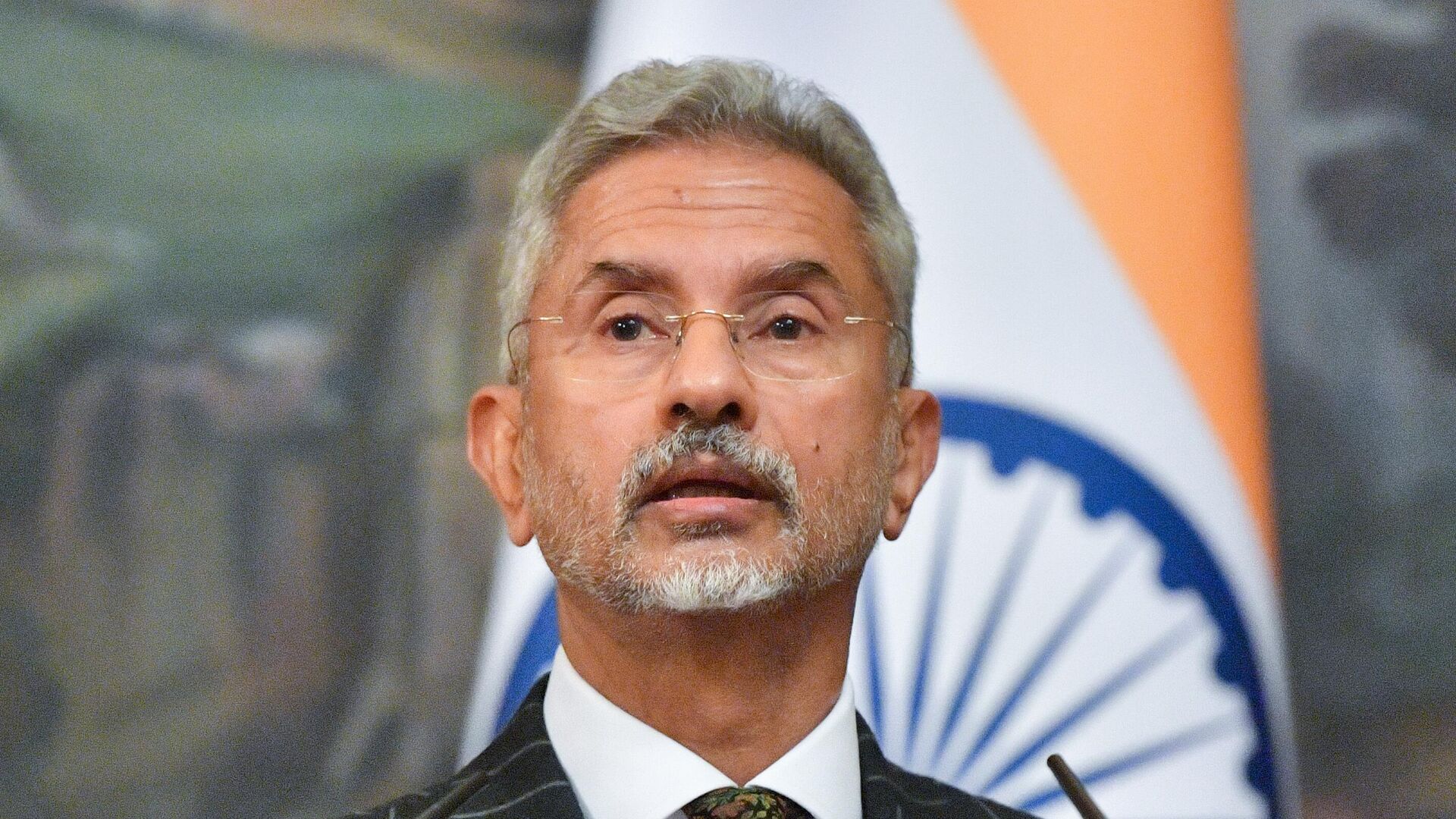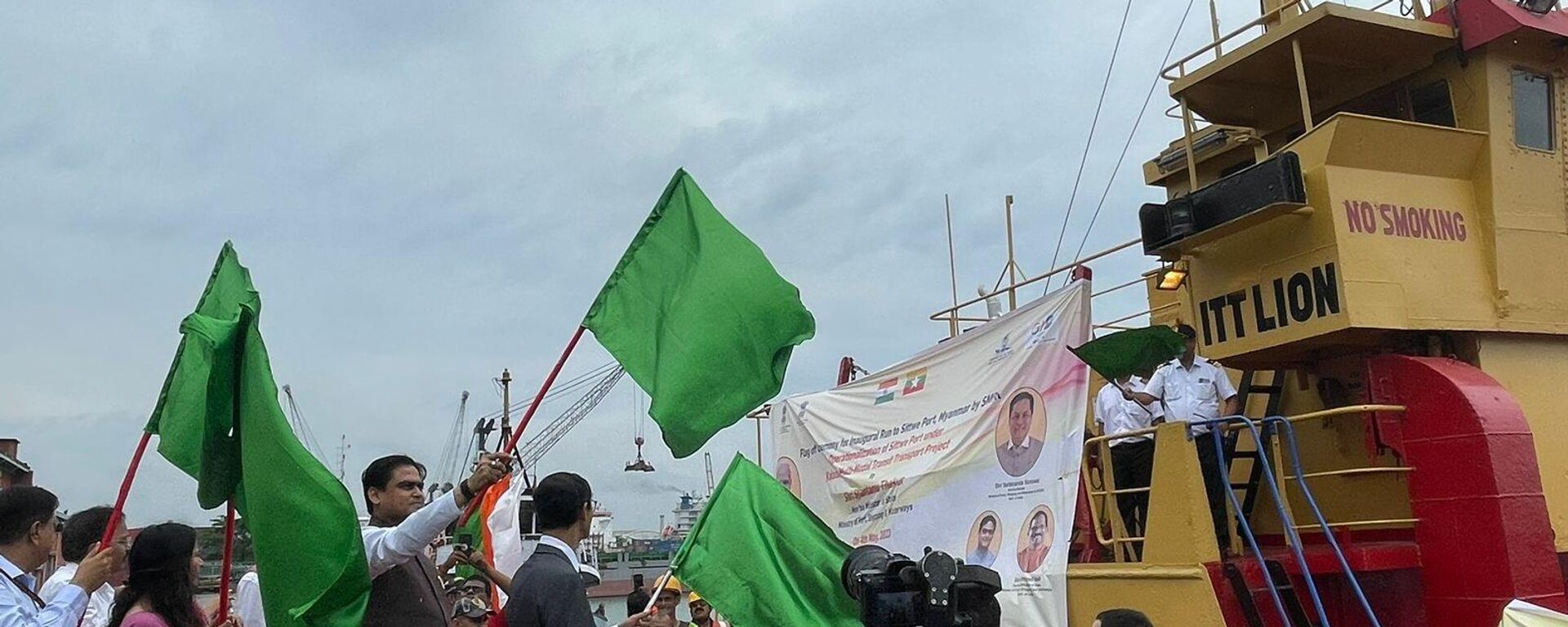https://sputniknews.in/20230513/land-connections-with-asean-is-of-utmost-importance-to-india-jaishankar-says-1941033.html
Land Connections With ASEAN is of ‘Utmost Importance’ to India, Jaishankar Says
Land Connections With ASEAN is of ‘Utmost Importance’ to India, Jaishankar Says
Sputnik India
Indian foreign minister S Jaishankar has said that developing “land connectivity” between India and the 10-member Association of Southeast Asian Nations (ASEAN) is of “utmost importance” for New Delhi.
2023-05-13T12:40+0530
2023-05-13T12:40+0530
2023-05-13T12:40+0530
india
asean
s. jaishankar
myanmar
china-pakistan economic corridor (cpec)
international north-south transport corridor (instc)
indian ocean
https://cdn1.img.sputniknews.in/img/07e7/03/02/1047426_0:158:2841:1756_1920x0_80_0_0_9028732c544b63435e31660e357c9e0d.jpg
India's external affairs minister Subrahmanyam Jaishankar has said that developing “land connections” between India and the 10-member Association of Southeast Asian Nations (ASEAN) is of “utmost importance” for New Delhi.Delivering his keynote remarks at the sixth gathering of the Indian Ocean Conference in Dhaka on Friday, the top Indian diplomat remarked that “smooth and efficient” connections between India and southeast Asia would be a “gamechanger”.The foreign minister noted that the region's hinterland was put to “disadvantage” as colonial powers at the time prioritised the development of coastal regions for their own interests.Besides opening a land route between India and ASEAN, Jaishankar said a “multimodal connectivity” between India and the Middle-East - as well connections between India and central Asia - was also “crucial” from India’s perspective.He added that direct connectivity between India and central Asia has its own “distinct challenges due to obstacles in between”, a reference to New Delhi’s strained ties with Pakistan and the security situation in Afghanistan.Along with Russia and other countries in the region, New Delhi is involved in efforts to operationalize fully the International North South Transport Corridor (INSTC), a 7,200km network of roads, railways and maritime routes connecting Russia to India through central Asia and Iran.The Indian government is also developing the Chabahar port in Iran to bypass Pakistan when it wants access to the markets of Afghanistan, central Asia and beyond.This month, top officials from India, Saudi Arabia, US and the UAE also met in Saudi Arabia to explore developing multimodal connectivity between the Middle-East and India, which include a railway.The Indian foreign minister reiterated during his address that connectivity projects should “respect” territorial integrity and sovereignty, an apparent reference to the China-Pakistan Economic Corridor (CPEC), a flagship initiative under China's Belt and Road Initiative (BRI). The CPEC passes through Pakistan-occupied Kashmir (PoK), a fact which has been objected to by New Delhi.Indian Ocean ‘Distinct’ From Larger Indo-PacificJaishankar highlighted during his address that the Indian Ocean Region (IOR) was “distinct” from the broader Indo-Pacific region, as it had its own set of challenges which were different from the Pacific nations.He flagged the issue of “unsustainable debt” as a major concern confronting the coastal states of the Indian Ocean.Jaishankar further noted that there were different “ecosystems” even within the Indian Ocean region, such as the Bay of Bengal at India’s eastern seaboard.He said that it was crucial to simultaneously tackle the needs of the countries in the Indian Ocean as well as the larger Indo-Pacific region.
https://sputniknews.in/20230504/milestone-for-regional-connectivity-india-funded-sittwe-port-in-myanmar-begins-operations-1819294.html
india
asean
myanmar
china-pakistan economic corridor (cpec)
indian ocean
Sputnik India
feedback.hindi@sputniknews.com
+74956456601
MIA „Rossiya Segodnya“
2023
Dhairya Maheshwari
https://cdn1.img.sputniknews.in/img/07e6/0c/13/138962_0:0:641:640_100x100_80_0_0_2cb44360dbcdf6d84bf4b299cd045917.jpg
Dhairya Maheshwari
https://cdn1.img.sputniknews.in/img/07e6/0c/13/138962_0:0:641:640_100x100_80_0_0_2cb44360dbcdf6d84bf4b299cd045917.jpg
News
en_IN
Sputnik India
feedback.hindi@sputniknews.com
+74956456601
MIA „Rossiya Segodnya“
Sputnik India
feedback.hindi@sputniknews.com
+74956456601
MIA „Rossiya Segodnya“
Dhairya Maheshwari
https://cdn1.img.sputniknews.in/img/07e6/0c/13/138962_0:0:641:640_100x100_80_0_0_2cb44360dbcdf6d84bf4b299cd045917.jpg
india-myanmar-thailand trilateral highway, myanmar news today, cpec india, cpec news, asean news, indian ocean conference, indo-pacific, instc, chabahar port
india-myanmar-thailand trilateral highway, myanmar news today, cpec india, cpec news, asean news, indian ocean conference, indo-pacific, instc, chabahar port
Land Connections With ASEAN is of ‘Utmost Importance’ to India, Jaishankar Says
New Delhi has called for the early launch of the 1,360km India-Myanmar-Thailand highway, which it maintains will allow it to access the markets of south-east Asia. The work on certain stretches of the project has been delayed by the security situation in Myanmar.
India's external affairs minister Subrahmanyam Jaishankar has said that developing “land connections” between India and the 10-member Association of Southeast Asian Nations (ASEAN) is of “utmost importance” for New Delhi.
Delivering his keynote remarks at the sixth gathering of the Indian Ocean Conference in Dhaka on Friday, the top Indian diplomat remarked that “smooth and efficient” connections between India and southeast Asia would be a “gamechanger”.
“Connectivity is a crucial issue for us. This is because the era of imperialism disrupted the natural links of the continent and created regional silos to serve their own needs,” he said.
The foreign minister noted that the region's hinterland was put to “disadvantage” as colonial powers at the time prioritised the development of coastal regions for their own interests.
“Building back is a long, painful and arduous process… It is still work in progress,” he emphasised.
Besides opening a land route between India and ASEAN, Jaishankar said a “multimodal connectivity” between India and the Middle-East - as well connections between India and central Asia - was also “crucial” from India’s perspective.
He added that direct connectivity between India and central Asia has its own “distinct challenges due to obstacles in between”, a reference to New Delhi’s strained ties with Pakistan and the security situation in Afghanistan.
Along with Russia and other countries in the region, New Delhi is involved in efforts to operationalize fully the International North South Transport Corridor (INSTC), a 7,200km network of roads, railways and maritime routes connecting Russia to India through central Asia and Iran.
The Indian government is also developing the Chabahar port in Iran to bypass Pakistan when it wants access to the markets of Afghanistan, central Asia and beyond.
This month, top officials from India, Saudi Arabia, US and the UAE also met in Saudi Arabia to explore developing multimodal connectivity between the Middle-East and India, which include a railway.
The Indian foreign minister reiterated during his address that connectivity projects should “respect” territorial integrity and sovereignty, an apparent reference to the China-Pakistan Economic Corridor (CPEC), a flagship initiative under China's Belt and Road Initiative (BRI). The CPEC passes through Pakistan-occupied Kashmir (PoK), a fact which has been objected to by New Delhi.
Indian Ocean ‘Distinct’ From Larger Indo-Pacific
Jaishankar highlighted during his address that the Indian Ocean Region (IOR) was “distinct” from the broader Indo-Pacific region, as it had its own set of challenges which were different from the Pacific nations.
“Many nations of the Indian Ocean still address developmental challenges that may no longer be relevant in the Pacific. There are distinct issues that arise from regional identities, colonial experiences and geo-political relationships,” he remarked.
He flagged the issue of “unsustainable debt” as a major concern confronting the coastal states of the Indian Ocean.
Jaishankar further noted that there were different “ecosystems” even within the Indian Ocean region, such as the Bay of Bengal at India’s eastern seaboard.
He said that it was crucial to simultaneously tackle the needs of the countries in the Indian Ocean as well as the larger Indo-Pacific region.



